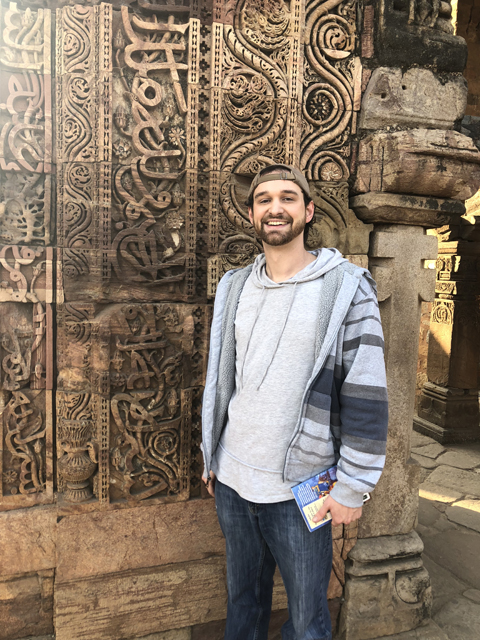
Andrew Howard at the Qutb Minar complex in Delhi, which contains one of the oldest mosques in India and has Arabic writing behind him in the same script used to write Urdu (and Persian). The mosque was built using stones from Hindu and Jain temples, which is evidenced by the Hindu deities and Jain motifs still visible on many of the stones within the complex.
The American Councils for International Education recently awarded Ohio University graduate student Andrew Howard a Critical Language Scholarship (CLS) Refresh award to study Urdu with the American Institute of India Studies.
Howard is a fifth-year student pursuing a Ph.D. in History and a Contemporary History Certificate, with a focus on the history of imperialism in South Asia. The award will allow him to continue his instruction in Urdu, a language he first learned while a U.S. Department of State CLS scholar in 2020.
“This is an excellent opportunity for me to continue to improve my knowledge of Urdu from home while writing my dissertation,” Howard said.
For Howard, mastering Urdu has the important added benefit of supplementing his research on South Asia’s past. “Many important documents in the archive are written in Urdu. Improving my Urdu enhances my research by including non-English sources in my research, broadening my historical perspective. I also believe that learning the language is the best way to learn about the culture.”
Howard, who completed his M.A. in History at Ohio in 2017, has been interested in Indian history, life and culture since his days as an undergraduate at Ohio Wesleyan University, where he earned a B.A. in history 2013. “The South Asian subcontinent is the pivot point of so many diverse civilizations. Its cultural vibrancy and interconnectedness with world history have always fascinated me.”
His first opportunity to experience life on the subcontinent, however, came in 2016 when he received a Contemporary History Institute summer travel grant to travel to India to study Hindi.
“Going to India was a life-changing experience. I didn’t know any Hindi when I arrived, and I was amazed with how much I knew by the time I left. The summer in India was also helpful in refining my interests and settling on a dissertation topic.”
This was followed a year later by a summer spent studying Hindi at the South Asian Summer Language Institute (SASLI) at the University of Wisconsin-Madison. He also has taken Hindi classes at Ohio University and been an active participant in Hindi language tables and other South Asian-related events on campus. He was awarded a CLS to study Urdu with the American Institute of India Studies in 2020, and was then awarded a Foreign Language and Area Studies grant to study Urdu at SASLI in 2021. Now, Howard will use the CLS Refresh award to work toward mastering this South Asian language, spoken by hundreds of millions of people.
“This award will ensure that all my past hard work does not go to waste. Everyone I’ve encountered in my five years of studying Hindi and Urdu has said, ‘you either use it or lose it,’ and I do not intend to lose it.”
When asked what language was next on his list, Howard replied: “My Urdu professor from SASLI this summer told me I could learn Persian in two weeks. I’m not so sure about that, but studying Hindi and Urdu has provided a solid foundation for continuing to expand my knowledge of other languages integral to my research as a historian.”
The Critical Language Scholarship, a program sponsored by the U.S. State Department and implemented by the American Councils for International Education, supports university students in learning languages essential to America’s engagement with the world.



















Comments